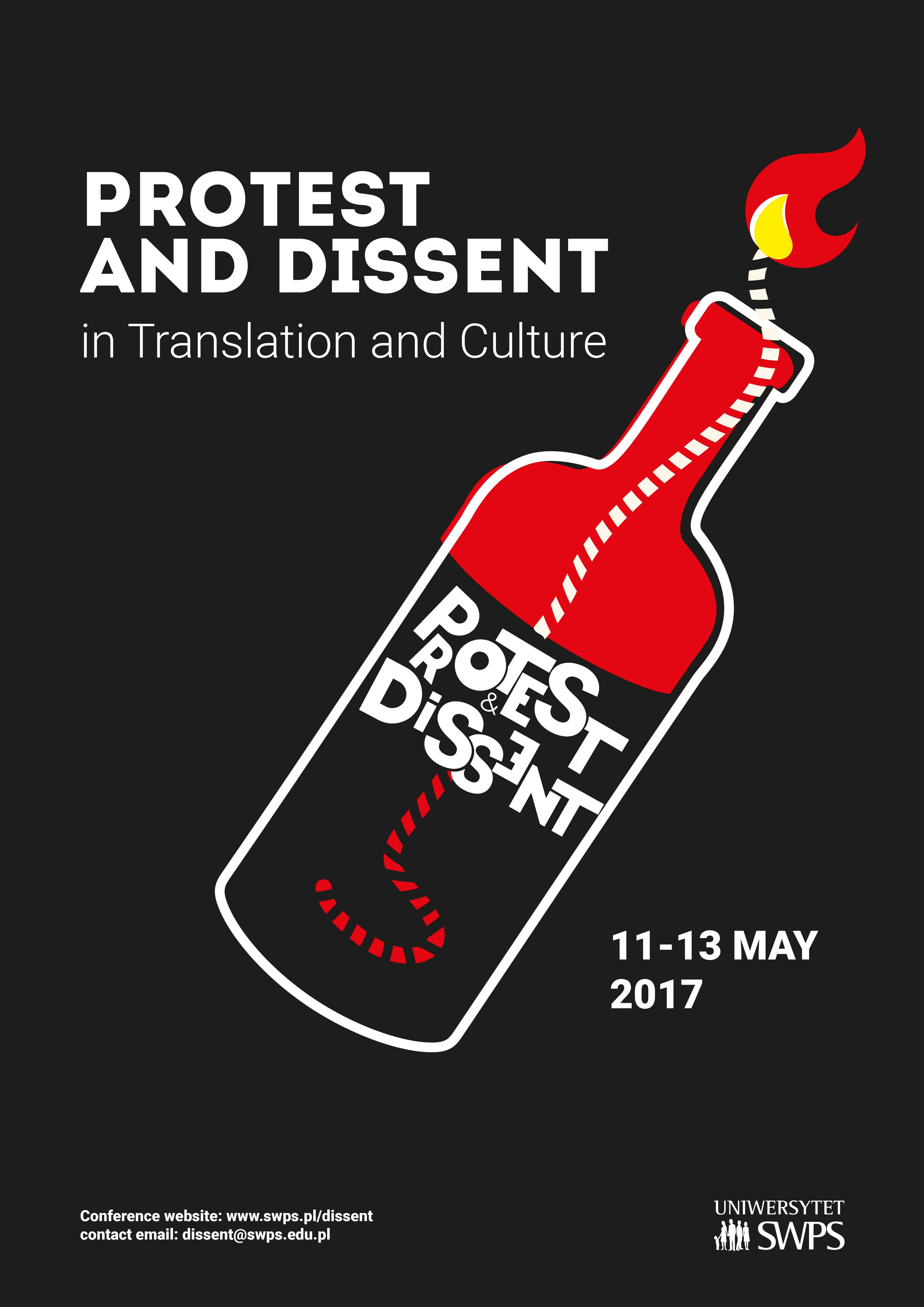Protest and Dissent in Translation and Culture

INTERNATIONAL CONFERENCE
Protest and Dissent
in translation AND CULTURE
Conference
May
11-13 2017
Warsaw
About the Conference
Though dissent and protest seem to be strongly linked with politics and with political actions, the range of their senses and uses is much broader and, as Amit Chaudhuri has noticed, dissent is inscribed in the very idea of the literary which, "in its resistance to interpretation, is a peculiar species of dissent." The common ground of protest and dissent is, very generally, a disagreement with what is, and an expression of the necessity of some change which seems to be standing behind the very gestures of dissension or protestation. This expression may take various forms and make use of various modalities coming from different cultures, states and places. Protest and dissent may sometimes be individual gestures, as seems to be the case with Melville's Bartleby's famous "I would prefer not to", though the outdoor reading of "Bartleby, the Scrivener" organized by Occupy Wall Street supporters at Zuccotti Park in New York in November 2011 was an event which renarrated the story as "resonating quite well with the mission of the OWS protest" because it not only questioned the assumed hierarchy and expressed the strength of passive resistance, but also because it was set on Wall Street. Dominance and resistance seem to be inevitably speaking through various narratives and stories we live by, the stories which are narrated and renarrated, framed and reframed in different social, political and language communities and realities, through different media and means, and translated into different contexts and languages. The notion of framing, Mona Baker claims in "Reframing Conflict in Translation", allows us "to see translational choices not merely as local linguistic challenges but as contributing directly to the narratives that shape our social world". The ways in which we name, rename, or label events, groups of people, even places have implications in the real world and may help us realize that the world is not made up of universally accepted norms, but that we also partake in negotiating its construction, its changing meanings and senses. Protest and dissent do not necessarily have to be an incentive to a revolutionary change, to a shift of the dominant, but may testify to there being what Edward Said called simply "something beyond the reach of dominating systems", something which limits power and "hobbles" it also through translatological resistance to finality.
Call for Papers
We invite papers looking at protest and dissent from different theoretical and methodological perspectives (Translation Studies, Literary Criticism, Critical Theory, Cultural Studies, Discourse Analysis, Feminist and Gender Studies, Queer Theory, Philosophy, Sociology, History of Ideas, Colonial and Postcolonial Studies), papers not only theorizing protest and dissent but also papers engaged in broadly understood disagreement, disapproval, critique or resistance, potentials of conflict management and/or the educational and pedagogical dimensions of dissent. We also invite papers showing how narratives of dissent and protest (novels, poems, stories, histories, films, news, press articles, protest songs …) are renarrated/translated in different social and political contexts and the ways in which translators' choices may be oriented or disoriented. If Jacques Rancière is right saying that "the essence of politics is the manifestation of dissensus as the presence of two worlds in one", then translation, as an inevitably divided activity, may be a kind of discourse which reveals that oneness may be one of those ideas which harbour consensual dominance and the end of politics, the end of dissensual plurality and the beginning of the police which, in different disguises, finds these days its way to the streets of numerous places of the world.
We suggest the following, broad, thematic areas as issues for disputes and highly probable clashes of ideas:
Rhetoric(s) of protest and dissent
Narrating/renarrating protest and dissent
Dissent and protest in intercultural contexts
Dissent and protest in the culture of global/local politics
Translating protest
Translating dissent
Translation-power-resistance
Empowerment and translation
Resisting power/power of resistance
Discourses of dissent and protest
Discursive strategies of protest and dissent
Discursive analyses of protest and dissent
Pedagogy/ies of dissent
Manipulating protest and dissent
Protest and persuasion
Conflict/protest/dissent
Translating conflict
Literature(s) of protest
Protest/dissent and media
Protest/attack/defense
Protesters/dissenters as friends
Protester/dissenters as enemies
Good guys and bad guys
Protest and activism
Activating/de-activating protest and dissent
Global dissents and/in translation
Solidarity in translation
Translating collectives/collective translations
Conference Posters


Keynote Speakers
Professor Mona Baker, University of Manchester, UK
Keynote Lecture Title: Researching Protest Movements: Methodological and Ethical Challenges
Professor Ben Dorfman, Aalborg University, Denmark
Keynote Lecture Title: “The Nation Again In The Twenty-First Century?", Or, How Do I Translate My Dissent Such That You Might Understand?
Professor Hanna Komorowska, University of Social Sciences and Humanities, Warsaw, Poland
Keynote Lecture Title: Protesting Over And Through The Language
Professor Tadeusz Rachwał, University of Social Sciences and Humanities, Warsaw, Poland
Keynote Lecture Title: On The "Yes" Of The Rebel
Organizers
- Agnieszka Pantuchowicz, Ph.D., SWPS University of Social Sciences and Humanities, Warsaw
- Anna Warso, Ph.D., SWPS University of Social Sciences and Humanities, Warsaw
Venue
SWPS University of Social Sciences and Humanities
Chodakowska 19/31, 03-815 Warsaw, Poland



